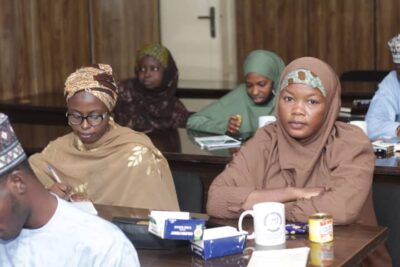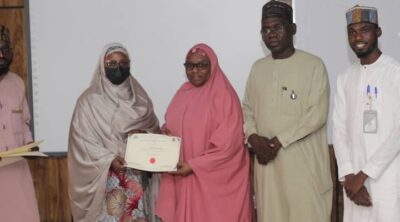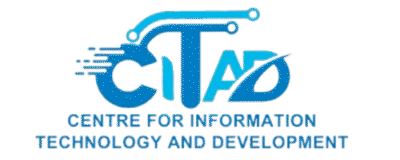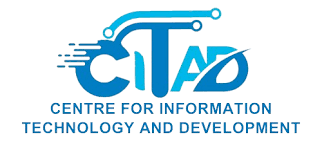The Centre for Information Technology and Development, CITAD, has concluded a three-day intensive training workshop for staff of Khalifa Isyaka Rabiu University, KHAIRUN, Kano. The focus of the training was on blockchain technology, financial innovation, and cryptocurrency.
The sessions, held at the Faculty of Science and Computing lecture hall of the university, ran daily from 9 in the morning until 1 in the afternoon, bringing together 18 participants. The aim was to equip staff with both theoretical and practical knowledge of financial technology known as fintech and its applications in academia and beyond.
Muhammad Bello Yahaya led a session on the evolution and scope of fintech, highlighting global and African trends as well as use cases in the education sector. He described fintech as the fusion of finance and technology, which is transforming banking, payments, and investments by making services more accessible and affordable. Similarly, Suhail Sani introduced participants to blockchain and cryptocurrency, clarifying that blockchain is the secure and transparent technology on which digital currencies like Bitcoin and Ethereum are built.
 The second day focused on practical applications. Ahmad Mubarak Ahmad, who was also a facilitator, demonstrated Yochaa, an app that allows users to compare and purchase shares across markets. Meanwhile, Yusuf Babagana guided participants through creating blockchain accounts and explained how blockchain could be applied in areas such as uploading student results, securing hospital records, tracking agriculture inputs like fertilizer, and ensuring transparency in supply chains.
The second day focused on practical applications. Ahmad Mubarak Ahmad, who was also a facilitator, demonstrated Yochaa, an app that allows users to compare and purchase shares across markets. Meanwhile, Yusuf Babagana guided participants through creating blockchain accounts and explained how blockchain could be applied in areas such as uploading student results, securing hospital records, tracking agriculture inputs like fertilizer, and ensuring transparency in supply chains.
The last day of the training was dedicated to hands-on training. Participants explored blockchain applications in financial transactions, learned to use Yochaa for investing, and discussed the risks and opportunities of cryptocurrency. The sessions also reflected on Nigeria’s fintech journey, from the introduction of the cashless policy in 2011 to the launch of the Central Bank Digital Currency—the eNaira.
Response from participants were praises, they applaud the workshop as highly interactive and insightful. They noted that it provided both theoretical grounding and real-life applications of the technologies.
Speaking at the event, Muhammad Sani Sa’idu, the coordinating officer of the training, revealed that less than ten percent of universities in Northern Nigeria currently teach fintech or blockchain. He stressed that while Lagos has been described as Africa’s innovation capital, the North is still far behind. According to him, CITAD’s intervention is meant to bridge this gap, urging universities to cascade the training to their students and even incorporate it into their curriculum.
Also commenting, CITAD data analyst and facilitator, Yusuf Babagana, observed that many lecturers are not familiar with emerging technologies. He said there is often a misconception that cryptocurrency is a scam, but with proper understanding, blockchain and fintech can play a transformative role in society.
The Vice-Chancellor of KHAIRUN, Professor Abdulrashid Garba, who declared the training open, described the workshop as a significant step in preparing staff for global technological changes. In the same vein, the Registrar of the university, Malam Yusuf Datti, commended CITAD for its commitment, noting that the training has broadened staff capacity in both teaching and administration.

Special commendation was given to the team that worked tirelessly to ensure the success of the training. Leading the effort was Muhammad Sani Sa’idu, supported by facilitators Muhammad Bello Yahya, Suhail Sani, Yusuf Babagana, and Ahmad Mubarak Ahmad. They were ably assisted by team members Buhari Abba, Amina Khalid Muhammad, Sadiya Ahmad Musa, Salim Sani, Aminu Wali, and Nazeem Haroun, whose combined contributions greatly enriched the program and ensured its smooth delivery.
By the end of the three days, participants agreed that fintech and blockchain innovations hold promise for improving education, agriculture, healthcare, and governance in Nigeria.
With this training, KHAIRUN becomes the third university to benefit from CITAD’s program, after Bayero University Kano and Baba Ahmed University. CITAD has reaffirmed its commitment to promoting digital literacy and innovation across Northern Nigeria’s academic institutions


